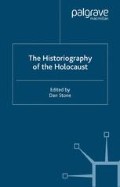Abstract
The internal division in modern philosophy between ‘Anglo-American’ (or analytic) and ‘Continental’ traditions is perhaps nowhere made more visible than in the vastly different significance each confers on the Nazi genocide. On the one hand, there has been little sustained engagement with the Holocaust within the Anglophone stream, from a metaphysical, ethico-political or other perspective. On the other, the death camps have insinuated themselves into the very heart of post-war European philosophy, calling its most cherished terms and concepts — the Idea, Reason, Spirit, the dialectic, History, Being — radically into question.
Access this chapter
Tax calculation will be finalised at checkout
Purchases are for personal use only
Preview
Unable to display preview. Download preview PDF.
Notes
J. Bernstein, TheFate ofArt:AestheticAlienation fromKant to Derrida (Oxford: Blackwell, 1992), pp. 6–8.
Other significant thinkers in this tradition include Ignaz Maybaum and Arthur A. Cohen. The former, a German-born British Reform rabbi, articulates perhaps the most extreme version of the second position, seeing the Holocaust as a sacrifice through which God brings His people to spiritual and historical maturity. The latter, an American theologian and novelist, is undoubtedly the thinker in this tradition closest to the third position, finding in the Holocaust a radical and insuperable crisis of Jewish theological categories. See I. Maybaum, The Face of God after Auschwitz (Amsterdam: Polak and Van Gennep, 1965), and A.A. Cohen, The Trernendum: A Theological Interpretation of the Holocaust (New York: Continuum, 1981).
R.L. Rubinstein, After Auschwitz (Baltimore, MD: Johns Hopkins University Press, 1992), hereafter AA. Rubinstein’s book was first published in 1966 with the subtitle ‘Radical Theology and Contemporary Judaism’, and reissued in substantially revised form in 1992 (‘nine of the fifteen chapters have been eliminated from the second edition, which has sixteen chapters, ten of them new to After Auschwitz’) with the subtitle ‘History, Theology and Contemporary Judaism’. For a statement of the differences between the two versions of the book, see the Preface to the 1992 edition. Because my concern in this study is not with the history of theological responses to Auschwitz but rather with the task of thought it imposes on the present, I have confined my reading of Rubinstein to commentary on the 1992 edition.
Z. Braiterman, (God) After Auschwitz (Princeton, NJ: Princeton University Press, 1998), pp. 92–3.
E. Berkowits, Faith after the Holocaust (New York: Ktav, 1973), hereafter FAH. The prefix ‘neo-’ is intended to indicate Berkowits’s distance from the theodicy prevalent amongst ultra-Orthodox interpreters for whom Auschwitz is an expression of God’s punishment ‘mipnei chateinu’ — ‘for our sins’. While remaining very much within normative Judaic boundaries, Berkowits creatively mobilizes the text of tradition against such an interpretation.
T.W. Adorno, Negative Dialectics, trans. E.B. Ashton (London: Routledge, 1973), p. 465. For a more sustained attempt to develop the implications of Adorno’s ‘new categorical imperative’, see my InterruptingAuschwitz: Art, Religion, Philosophy (London: Continuum, 2003).
M. Blanchot, The Writing of the Disaster, trans. A. Smock (Lincoln: Nebraska University Press, 1986); amongst the relevant texts of the other authors are J. Derrida, Cinders, trans. N. Lukacher (Lincoln: Nebraska University Press, 1991); P. Lacoue-Labarthe, The Fiction of the Political: Heidegger, Art and Politics, trans. C. Turner (Oxford: Blackwell, 1990); idem, Poetry as Experience, trans. A. Tamowski (Stanford: Stanford University Press, 1999); P. Lacoue-Labarthe and J.-L. Nancy, Le Mythe Nazi (La Tour D’Aigues: Editions L’Aube, 1991); J.-L. Nancy, The Experience of Freedom, trans. B. McDonald (Stanford: Stanford University Press, 1993); J.-F. Lyotard, The Differend: Phrases in Dispute, trans. G. Van Den Abbeele (Manchester: Manchester University Press, 1988); idem, Heidegger and ‘the jews’, trans. A. Michel and M. Roberts (Minneapolis: University of Minnesota Press, 1990); S. Kofman, Smothered Words, trans. M. Dobie (Evanston, IL: Northwestern University Press, 1998); E. Jabes, The Book of Questions, vol. One, trans. R. Waldrop (Hanover, MA: University Press of New England, 1991); G. Agamben, Remnants of Auschwitz: The Witness and the Archive, trans. D. Heller-Roazen (New York: Zone Books, 1999).
E. Levinas, ‘Reflections on the Philosophy of Hitlerism’, Critical Inquiry, 17 (1990), 63–71.
E. Wyschogrod, Spirit in Ashes: Hegel, Heidegger and Man-Made Mass Death (New Haven, CT: Yale University Press, 1985), p. 28.
P. Lacoue-Labarthe and J.-L. Nancy, ‘The Nazi Myth’, Critical Inquiry, 16 (1990), 311.
G. Agamben, Homo Sacer: Sovereign Power and Bare Life, trans. D. Heller-Roazen (Stanford: Stanford University Press, 1998).
T.W. Adorno, Aesthetic Theory, trans. R. Hullot-Kentor (Minnesota: University of Minnesota Press, 1997), p. 2; hereafter AT.
T.W. Adorno, ‘Cultural Criticism and Society’, in Prisms, trans S. Weber (Cambridge, MA: MIT Press, 1983), p. 34.
T.W. Adorno, ‘Trying to Understand Endgame’, in Notes to Literature, vol. 1, trans. S.W. Nicholsen (New York: Columbia University Press, 1991), p. 1; hereafter NL.
E. Levinas, Totality and Infinity, trans. A. Lingis (Pittsburgh, PA: Duquesne University Press, 1971), p. 80; hereafter TI.
E. Levinas, Otherwise Than Being, or Beyond Essence, trans. A. Lingis (Pittsburgh, PA: Duquesne University Press, 1998), p. 149; hereafter OB.
E. Levinas, ‘From Consciousness to Wakefulness: Starting from Husserl’, in Of God Who Comes to Mind, trans. B. Bergo (Stanford: Stanford University Press, 1998), p. 30.
In Face to Face with Emmanuel Levinas, ed. R.A. Cohen (Albany, NY: SUNY Press, 1986), p. 31.
E. Levinas, ‘Messianic Texts’, in Difficult Freedom, trans. S. Hand (Baltimore, MD: Johns Hopkins University Press, 1997), p. 90.
E. Levinas, ‘Diachrony and Representation’, in Entre-Nous: On Thinking of the Other, trans. M.B. Smith (London: Athlone, 1998), p. 177.
Editor information
Editors and Affiliations
Copyright information
© 2004 Palgrave Macmillan, a division of Macmillan Publishers Limited
About this chapter
Cite this chapter
Cohen, J. (2004). Post-Holocaust Philosophy. In: Stone, D. (eds) The Historiography of the Holocaust. Palgrave Macmillan, London. https://doi.org/10.1057/9780230524507_22
Download citation
DOI: https://doi.org/10.1057/9780230524507_22
Publisher Name: Palgrave Macmillan, London
Print ISBN: 978-1-4039-9927-6
Online ISBN: 978-0-230-52450-7
eBook Packages: Palgrave History CollectionHistory (R0)

